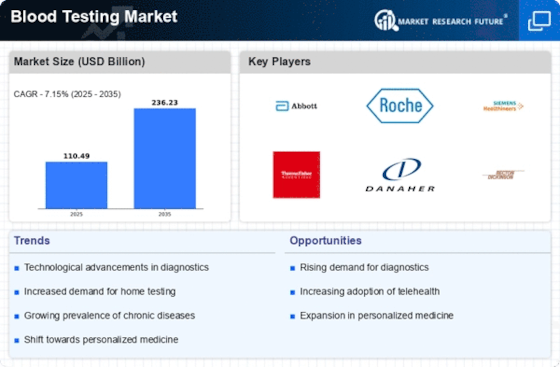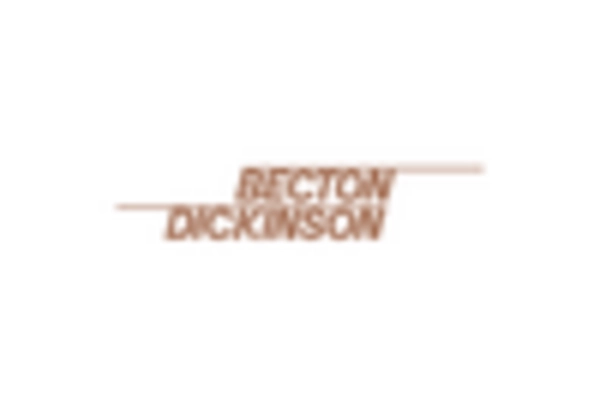Complete Blood Count
Blood Chemistry Tests
Blood Glucose Tests
Coagulation Tests
Blood Typing Tests
Hospitals
Diagnostic Laboratories
Home Care Settings
Research Institutions
Reagents
Consumables
Instruments
Software
North America
Europe
South America
Asia Pacific
Middle East and Africa
North America Outlook (USD Billion, 2019-2035)
North America Blood Testing Market by Test Type
Complete Blood Count
Blood Chemistry Tests
Blood Glucose Tests
Coagulation Tests
Blood Typing Tests
North America Blood Testing Market by End User Type
Hospitals
Diagnostic Laboratories
Home Care Settings
Research Institutions
North America Blood Testing Market by Product Type
Reagents
Consumables
Instruments
Software
North America Blood Testing Market by Regional Type
US
Canada
US Outlook (USD Billion, 2019-2035)
US Blood Testing Market by Test Type
Complete Blood Count
Blood Chemistry Tests
Blood Glucose Tests
Coagulation Tests
Blood Typing Tests
US Blood Testing Market by End User Type
Hospitals
Diagnostic Laboratories
Home Care Settings
Research Institutions
US Blood Testing Market by Product Type
Reagents
Consumables
Instruments
Software
CANADA Outlook (USD Billion, 2019-2035)
CANADA Blood Testing Market by Test Type
Complete Blood Count
Blood Chemistry Tests
Blood Glucose Tests
Coagulation Tests
Blood Typing Tests
CANADA Blood Testing Market by End User Type
Hospitals
Diagnostic Laboratories
Home Care Settings
Research Institutions
CANADA Blood Testing Market by Product Type
Reagents
Consumables
Instruments
Software
Europe Outlook (USD Billion, 2019-2035)
Europe Blood Testing Market by Test Type
Complete Blood Count
Blood Chemistry Tests
Blood Glucose Tests
Coagulation Tests
Blood Typing Tests
Europe Blood Testing Market by End User Type
Hospitals
Diagnostic Laboratories
Home Care Settings
Research Institutions
Europe Blood Testing Market by Product Type
Reagents
Consumables
Instruments
Software
Europe Blood Testing Market by Regional Type
Germany
UK
France
Russia
Italy
Spain
Rest of Europe
GERMANY Outlook (USD Billion, 2019-2035)
GERMANY Blood Testing Market by Test Type
Complete Blood Count
Blood Chemistry Tests
Blood Glucose Tests
Coagulation Tests
Blood Typing Tests
GERMANY Blood Testing Market by End User Type
Hospitals
Diagnostic Laboratories
Home Care Settings
Research Institutions
GERMANY Blood Testing Market by Product Type
Reagents
Consumables
Instruments
Software
UK Outlook (USD Billion, 2019-2035)
UK Blood Testing Market by Test Type
Complete Blood Count
Blood Chemistry Tests
Blood Glucose Tests
Coagulation Tests
Blood Typing Tests
UK Blood Testing Market by End User Type
Hospitals
Diagnostic Laboratories
Home Care Settings
Research Institutions
UK Blood Testing Market by Product Type
Reagents
Consumables
Instruments
Software
FRANCE Outlook (USD Billion, 2019-2035)
FRANCE Blood Testing Market by Test Type
Complete Blood Count
Blood Chemistry Tests
Blood Glucose Tests
Coagulation Tests
Blood Typing Tests
FRANCE Blood Testing Market by End User Type
Hospitals
Diagnostic Laboratories
Home Care Settings
Research Institutions
FRANCE Blood Testing Market by Product Type
Reagents
Consumables
Instruments
Software
RUSSIA Outlook (USD Billion, 2019-2035)
RUSSIA Blood Testing Market by Test Type
Complete Blood Count
Blood Chemistry Tests
Blood Glucose Tests
Coagulation Tests
Blood Typing Tests
RUSSIA Blood Testing Market by End User Type
Hospitals
Diagnostic Laboratories
Home Care Settings
Research Institutions
RUSSIA Blood Testing Market by Product Type
Reagents
Consumables
Instruments
Software
ITALY Outlook (USD Billion, 2019-2035)
ITALY Blood Testing Market by Test Type
Complete Blood Count
Blood Chemistry Tests
Blood Glucose Tests
Coagulation Tests
Blood Typing Tests
ITALY Blood Testing Market by End User Type
Hospitals
Diagnostic Laboratories
Home Care Settings
Research Institutions
ITALY Blood Testing Market by Product Type
Reagents
Consumables
Instruments
Software
SPAIN Outlook (USD Billion, 2019-2035)
SPAIN Blood Testing Market by Test Type
Complete Blood Count
Blood Chemistry Tests
Blood Glucose Tests
Coagulation Tests
Blood Typing Tests
SPAIN Blood Testing Market by End User Type
Hospitals
Diagnostic Laboratories
Home Care Settings
Research Institutions
SPAIN Blood Testing Market by Product Type
Reagents
Consumables
Instruments
Software
REST OF EUROPE Outlook (USD Billion, 2019-2035)
REST OF EUROPE Blood Testing Market by Test Type
Complete Blood Count
Blood Chemistry Tests
Blood Glucose Tests
Coagulation Tests
Blood Typing Tests
REST OF EUROPE Blood Testing Market by End User Type
Hospitals
Diagnostic Laboratories
Home Care Settings
Research Institutions
REST OF EUROPE Blood Testing Market by Product Type
Reagents
Consumables
Instruments
Software
APAC Outlook (USD Billion, 2019-2035)
APAC Blood Testing Market by Test Type
Complete Blood Count
Blood Chemistry Tests
Blood Glucose Tests
Coagulation Tests
Blood Typing Tests
APAC Blood Testing Market by End User Type
Hospitals
Diagnostic Laboratories
Home Care Settings
Research Institutions
APAC Blood Testing Market by Product Type
Reagents
Consumables
Instruments
Software
APAC Blood Testing Market by Regional Type
China
India
Japan
South Korea
Malaysia
Thailand
Indonesia
Rest of APAC
CHINA Outlook (USD Billion, 2019-2035)
CHINA Blood Testing Market by Test Type
Complete Blood Count
Blood Chemistry Tests
Blood Glucose Tests
Coagulation Tests
Blood Typing Tests
CHINA Blood Testing Market by End User Type
Hospitals
Diagnostic Laboratories
Home Care Settings
Research Institutions
CHINA Blood Testing Market by Product Type
Reagents
Consumables
Instruments
Software
INDIA Outlook (USD Billion, 2019-2035)
INDIA Blood Testing Market by Test Type
Complete Blood Count
Blood Chemistry Tests
Blood Glucose Tests
Coagulation Tests
Blood Typing Tests
INDIA Blood Testing Market by End User Type
Hospitals
Diagnostic Laboratories
Home Care Settings
Research Institutions
INDIA Blood Testing Market by Product Type
Reagents
Consumables
Instruments
Software
JAPAN Outlook (USD Billion, 2019-2035)
JAPAN Blood Testing Market by Test Type
Complete Blood Count
Blood Chemistry Tests
Blood Glucose Tests
Coagulation Tests
Blood Typing Tests
JAPAN Blood Testing Market by End User Type
Hospitals
Diagnostic Laboratories
Home Care Settings
Research Institutions
JAPAN Blood Testing Market by Product Type
Reagents
Consumables
Instruments
Software
SOUTH KOREA Outlook (USD Billion, 2019-2035)
SOUTH KOREA Blood Testing Market by Test Type
Complete Blood Count
Blood Chemistry Tests
Blood Glucose Tests
Coagulation Tests
Blood Typing Tests
SOUTH KOREA Blood Testing Market by End User Type
Hospitals
Diagnostic Laboratories
Home Care Settings
Research Institutions
SOUTH KOREA Blood Testing Market by Product Type
Reagents
Consumables
Instruments
Software
MALAYSIA Outlook (USD Billion, 2019-2035)
MALAYSIA Blood Testing Market by Test Type
Complete Blood Count
Blood Chemistry Tests
Blood Glucose Tests
Coagulation Tests
Blood Typing Tests
MALAYSIA Blood Testing Market by End User Type
Hospitals
Diagnostic Laboratories
Home Care Settings
Research Institutions
MALAYSIA Blood Testing Market by Product Type
Reagents
Consumables
Instruments
Software
THAILAND Outlook (USD Billion, 2019-2035)
THAILAND Blood Testing Market by Test Type
Complete Blood Count
Blood Chemistry Tests
Blood Glucose Tests
Coagulation Tests
Blood Typing Tests
THAILAND Blood Testing Market by End User Type
Hospitals
Diagnostic Laboratories
Home Care Settings
Research Institutions
THAILAND Blood Testing Market by Product Type
Reagents
Consumables
Instruments
Software
INDONESIA Outlook (USD Billion, 2019-2035)
INDONESIA Blood Testing Market by Test Type
Complete Blood Count
Blood Chemistry Tests
Blood Glucose Tests
Coagulation Tests
Blood Typing Tests
INDONESIA Blood Testing Market by End User Type
Hospitals
Diagnostic Laboratories
Home Care Settings
Research Institutions
INDONESIA Blood Testing Market by Product Type
Reagents
Consumables
Instruments
Software
REST OF APAC Outlook (USD Billion, 2019-2035)
REST OF APAC Blood Testing Market by Test Type
Complete Blood Count
Blood Chemistry Tests
Blood Glucose Tests
Coagulation Tests
Blood Typing Tests
REST OF APAC Blood Testing Market by End User Type
Hospitals
Diagnostic Laboratories
Home Care Settings
Research Institutions
REST OF APAC Blood Testing Market by Product Type
Reagents
Consumables
Instruments
Software
South America Outlook (USD Billion, 2019-2035)
South America Blood Testing Market by Test Type
Complete Blood Count
Blood Chemistry Tests
Blood Glucose Tests
Coagulation Tests
Blood Typing Tests
South America Blood Testing Market by End User Type
Hospitals
Diagnostic Laboratories
Home Care Settings
Research Institutions
South America Blood Testing Market by Product Type
Reagents
Consumables
Instruments
Software
South America Blood Testing Market by Regional Type
Brazil
Mexico
Argentina
Rest of South America
BRAZIL Outlook (USD Billion, 2019-2035)
BRAZIL Blood Testing Market by Test Type
Complete Blood Count
Blood Chemistry Tests
Blood Glucose Tests
Coagulation Tests
Blood Typing Tests
BRAZIL Blood Testing Market by End User Type
Hospitals
Diagnostic Laboratories
Home Care Settings
Research Institutions
BRAZIL Blood Testing Market by Product Type
Reagents
Consumables
Instruments
Software
MEXICO Outlook (USD Billion, 2019-2035)
MEXICO Blood Testing Market by Test Type
Complete Blood Count
Blood Chemistry Tests
Blood Glucose Tests
Coagulation Tests
Blood Typing Tests
MEXICO Blood Testing Market by End User Type
Hospitals
Diagnostic Laboratories
Home Care Settings
Research Institutions
MEXICO Blood Testing Market by Product Type
Reagents
Consumables
Instruments
Software
ARGENTINA Outlook (USD Billion, 2019-2035)
ARGENTINA Blood Testing Market by Test Type
Complete Blood Count
Blood Chemistry Tests
Blood Glucose Tests
Coagulation Tests
Blood Typing Tests
ARGENTINA Blood Testing Market by End User Type
Hospitals
Diagnostic Laboratories
Home Care Settings
Research Institutions
ARGENTINA Blood Testing Market by Product Type
Reagents
Consumables
Instruments
Software
REST OF SOUTH AMERICA Outlook (USD Billion, 2019-2035)
REST OF SOUTH AMERICA Blood Testing Market by Test Type
Complete Blood Count
Blood Chemistry Tests
Blood Glucose Tests
Coagulation Tests
Blood Typing Tests
REST OF SOUTH AMERICA Blood Testing Market by End User Type
Hospitals
Diagnostic Laboratories
Home Care Settings
Research Institutions
REST OF SOUTH AMERICA Blood Testing Market by Product Type
Reagents
Consumables
Instruments
Software
MEA Outlook (USD Billion, 2019-2035)
MEA Blood Testing Market by Test Type
Complete Blood Count
Blood Chemistry Tests
Blood Glucose Tests
Coagulation Tests
Blood Typing Tests
MEA Blood Testing Market by End User Type
Hospitals
Diagnostic Laboratories
Home Care Settings
Research Institutions
MEA Blood Testing Market by Product Type
Reagents
Consumables
Instruments
Software
MEA Blood Testing Market by Regional Type
GCC Countries
South Africa
Rest of MEA
GCC COUNTRIES Outlook (USD Billion, 2019-2035)
GCC COUNTRIES Blood Testing Market by Test Type
Complete Blood Count
Blood Chemistry Tests
Blood Glucose Tests
Coagulation Tests
Blood Typing Tests
GCC COUNTRIES Blood Testing Market by End User Type
Hospitals
Diagnostic Laboratories
Home Care Settings
Research Institutions
GCC COUNTRIES Blood Testing Market by Product Type
Reagents
Consumables
Instruments
Software
SOUTH AFRICA Outlook (USD Billion, 2019-2035)
SOUTH AFRICA Blood Testing Market by Test Type
Complete Blood Count
Blood Chemistry Tests
Blood Glucose Tests
Coagulation Tests
Blood Typing Tests
SOUTH AFRICA Blood Testing Market by End User Type
Hospitals
Diagnostic Laboratories
Home Care Settings
Research Institutions
SOUTH AFRICA Blood Testing Market by Product Type
Reagents
Consumables
Instruments
Software
REST OF MEA Outlook (USD Billion, 2019-2035)
REST OF MEA Blood Testing Market by Test Type
Complete Blood Count
Blood Chemistry Tests
Blood Glucose Tests
Coagulation Tests
Blood Typing Tests
REST OF MEA Blood Testing Market by End User Type
Hospitals
Diagnostic Laboratories
Home Care Settings
Research Institutions
REST OF MEA Blood Testing Market by Product Type
Reagents
Consumables
Instruments
Software


















Leave a Comment